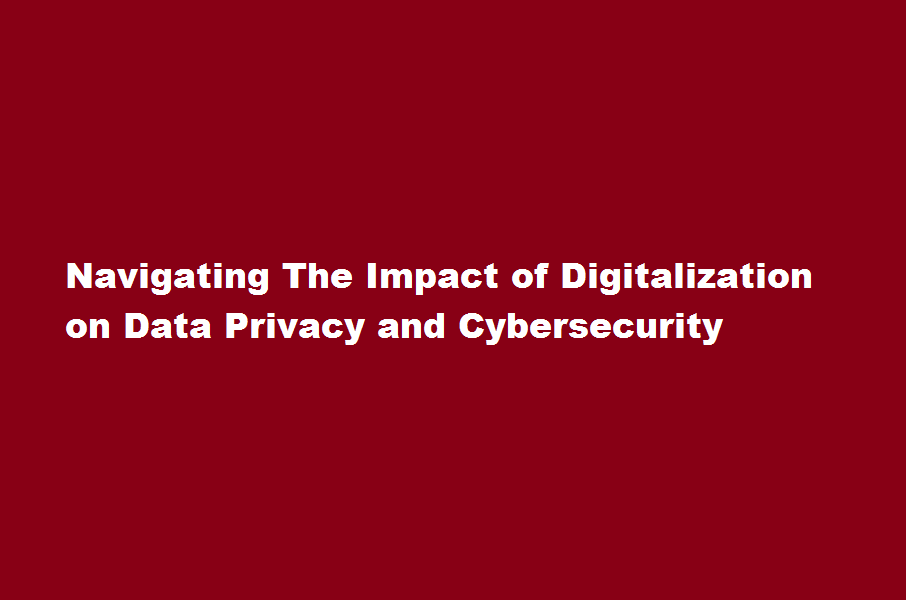Navigating The Impact of Digitalization on Data Privacy and Cybersecurity
4 min read
Introduction
Digitalization has brought about a rapid transformation in various sectors, revolutionizing the way we live, work, and communicate. However, with the increased reliance on digital technologies and the interconnectedness they bring, data privacy and cybersecurity have become critical concerns. This article examines the impact of digitalization on data privacy and cybersecurity, addressing the challenges and exploring strategies to safeguard sensitive information in the digital age.
Heightened Data Privacy Risks
Digitalization has led to an explosion of data, with individuals and organizations generating and sharing vast amounts of information online. This has heightened the risks associated with data privacy, as personal and sensitive data are vulnerable to unauthorized access, misuse, and breaches. It is crucial for individuals and organizations to adopt robust data privacy practices, including secure data storage, encryption, consent management, and compliance with privacy regulations like the General Data Protection Regulation (GDPR).
Evolving Cybersecurity Threats
Digitalization has created a new landscape of cybersecurity threats, with sophisticated cybercriminals constantly adapting their tactics. From phishing attacks and ransomware to data breaches and identity theft, organizations and individuals face a wide range of cybersecurity risks. It is essential to implement comprehensive cybersecurity measures, such as strong access controls, regular software updates, employee training on cybersecurity best practices, and the use of advanced security technologies like firewalls, antivirus software, and intrusion detection systems.
Internet of Things (IoT) Vulnerabilities
Digitalization has led to the proliferation of connected devices through the Internet of Things (IoT). While IoT offers numerous benefits, such as improved automation and efficiency, it also introduces new security vulnerabilities. Insecure IoT devices can serve as entry points for cyberattacks, compromising entire networks. To mitigate IoT-related risks, manufacturers and users must prioritize security in device design, implement encryption and authentication mechanisms, and regularly update firmware to patch vulnerabilities.
Big Data and Analytics Challenges
Digitalization has facilitated the collection and analysis of vast amounts of data for insights and decision-making. However, the use of big data and analytics presents unique challenges for data privacy and cybersecurity. Organizations must ensure proper anonymization and de-identification techniques are employed when handling sensitive data. Additionally, data governance frameworks, secure data sharing protocols, and stringent access controls should be established to protect data integrity and prevent unauthorized use.
Regulatory Compliance and Accountability
Digitalization has prompted the introduction of stringent data privacy and cybersecurity regulations globally. Organizations are now required to comply with regulations such as the GDPR, the California Consumer Privacy Act (CCPA), and other industry-specific standards. Compliance entails implementing privacy-by-design principles, conducting data protection impact assessments, and establishing robust incident response plans. Organizations must prioritize accountability and transparency in their data handling practices to build trust with customers and stakeholders.
Collaborative Approaches to Cybersecurity
Digitalization has underscored the importance of collaboration in combating cybersecurity threats. Government agencies, private sector organizations, and individuals must work together to share threat intelligence, promote cybersecurity awareness, and develop effective incident response strategies. International cooperation is vital in addressing cross-border cyber threats and establishing global cybersecurity norms and standards.
Frequently Asked Questions
How can individuals protect their data privacy in the digital age?
Individuals can protect their data privacy by using strong passwords, enabling two-factor authentication, being cautious of phishing attempts, regularly updating software, limiting data sharing, and reviewing privacy settings on online platforms.
What steps can organizations take to enhance cybersecurity defenses?
Organizations can enhance cybersecurity defenses by conducting regular risk assessments, implementing multi-layered security measures, educating employees on cybersecurity best practices, performing regular security audits, and establishing incident response plans.
How does digitalization impact the privacy of personal health information?
Digitalization in the healthcare industry introduces challenges and opportunities for privacy protection. Strict security measures, encryption, and adherence to privacy regulations are crucial in safeguarding personal health information and ensuring patient confidentiality in electronic health records and telemedicine applications.
What is the role of artificial intelligence in data privacy and cybersecurity?
Artificial intelligence (AI) plays a dual role in data privacy and cybersecurity. While AI-powered technologies can enhance cybersecurity defenses, detect anomalies, and automate threat response, they also raise concerns regarding privacy, transparency, and potential biases in data processing. Proper governance frameworks are necessary to ensure responsible and ethical use of AI in these domains.
How can organizations prepare for emerging cybersecurity threats associated with digitalization?
Organizations can prepare for emerging cybersecurity threats by staying updated on the latest threats and vulnerabilities, investing in advanced security technologies, conducting regular security assessments and audits, fostering a culture of cybersecurity awareness, and engaging in continuous training and education for employees.
Conclusion
Digitalization has revolutionized the way we handle data and conduct business, but it has also introduced new challenges for data privacy and cybersecurity. Protecting sensitive information in the digital age requires a proactive and collaborative approach, with individuals, organizations, and governments all playing a crucial role. By adopting robust data privacy practices, implementing comprehensive cybersecurity measures, and staying vigilant in the face of emerging threats, we can navigate the impact of digitalization while safeguarding data privacy and ensuring a secure digital future.
Read Also : The Transformational Impact of Digitalization on the Healthcare Industry





